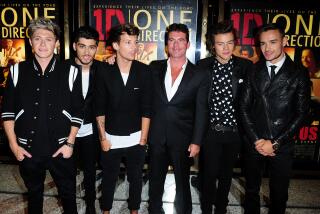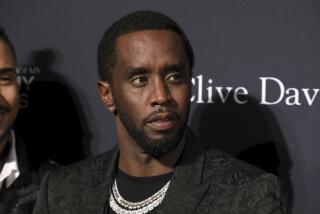OSBOURNE DENOUNCES SUIT IN TEEN-AGER’S SUICIDE
- Share via
Ozzy Osbourne, a heavy metal British rock star whose name and performances have often been connected with death and violence, called a press conference Tuesday to denounce a lawsuit that has implicated him in the 1984 suicide of an Indio teen-ager.
Though he said he felt sadness upon learning of the youth’s death, Osbourne said he did not feel any responsibility. In the suit, Osbourne’s often violent and morbid music was blamed for contributing to the young man’s suicide.
“I’m not going to start singing Barry Manilow songs” as a result of the lawsuit, Osbourne promised.
The singer’s attorney, Los Angeles lawyer Howard L. Weitzman, portrayed his client as “a family man with a wife and three children who understands parents’ concerns” rather than as an exploitative lyricist whose “Suicide Solution” allegedly influenced 19-year-old John McCollum to kill himself.
McCollum shot himself with a .22-caliber pistol after brooding for several hours in his room on Oct. 25, 1984. He had been listening to the Osbourne composition on a pair of earphones that were still on his head after his body was discovered.
McCollum’s parents reportedly filed the suit in Los Angeles Superior Court last October, seeking damages from both Osbourne and his record label, Epic Records. An Epic spokesman said that the CBS-owned label still had not been served with the suit as of Tuesday.
The suit did not come to public attention until last week when the McCollums’ attorney, Thomas Anderson, called a press conference. He announced that the suit had been filed as much to “teach the record companies a lesson” as to seek damages for the youth’s death.
Weitzman called Anderson’s comments “slanderous, preposterous and ludicrous,” adding that Osbourne’s reputation and career had been damaged. The song “Suicide Solution” was actually an anti-suicide song about a friend of Osbourne who drank himself to death, Weitzman said.
Osbourne identified the late friend about whom the song was written as a former singer with the group AC/DC.
Weitzman said he was as concerned about artistic freedom as he was about Osbourne’s own reputation. He challenged Anderson and the McCollums to find a connection between “Romeo and Juliet” and teen-age suicide; between the Beatles’ “Helter Skelter” and the Tate-La Bianca murders; and between the film “The Texas Chain Saw Massacre” and serial murderers.
“Next, songs will have to be monitored and approved before they (performers) can go on stage,” he said.
Osbourne rose to international notoriety several years ago on the strength of an unsubstantiated report that he had bitten the head off a dove while performing on stage. Though he did not deny the stunt initially, the report got beyond being a rumor. Within the recording industry, the story was believed to be a clever bit of press agentry, designed to boost Osbourne’s record sales.
In addition to defending his name, Osbourne also called Tuesday’s press conference to announce the release next week of a new record album. Called “The Ultimate Sin,” the album contains nine songs that denounce nuclear war, according to a press release distributed during the press conference.
Osbourne’s head is depicted on the album cover superimposed on the body of a “gryphon-like monster looming next to a beautiful witch-like woman while a nuclear bomb explodes in the background,” according to the release.
More to Read
The biggest entertainment stories
Get our big stories about Hollywood, film, television, music, arts, culture and more right in your inbox as soon as they publish.
You may occasionally receive promotional content from the Los Angeles Times.










